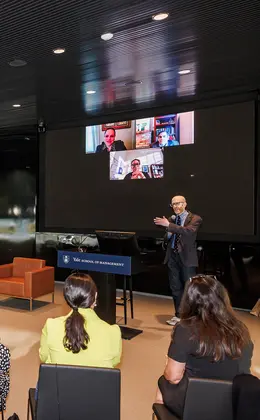
Pozen-Commonwealth Fund Fellows Reflect on Their Time at Yale and the Path Ahead
A dinner at Evans Hall celebrated graduates of the Pozen-Commonwealth Fund Fellowship in Health Equity Leadership, which brings mid-career healthcare professionals with a commitment to health equity to the MBA for Executives program each year.
When Bradley Richards, assistant lecturer in management, arrived to a May 2 dinner with current and past recipients of the Pozen-Commonwealth Fund Fellowship in Health Equity Leadership, he felt good about the future of healthcare.
“Sitting with this year’s graduating fellows, I was filled with a deep sense of hope,” Richards said. “The fellows’ current and future contributions will be vital on the long journey to address the inequities that are pervasive in our healthcare delivery systems.”
The Pozen-Commonwealth Fund Fellowship brings healthcare professionals to New Haven each year to pursue an MBA for Executives degree alongside specialized study of health equity issues. Over the course of a 22-month program, fellows gain the deep understanding of teams, markets, and organizations necessary to tackle major inequities in the U.S. healthcare system. For a dinner celebrating this year’s graduating cohort, fellowship alumni traveled from across the country, while members of the incoming class had the opportunity to meet those who came before them.
Dr. Howard Forman, who directs the MBA for Executives healthcare curriculum, kicked off the evening by highlighting the achievements of the graduating fellows. Following his speech, fellowship director and School of Medicine professor Dr. Marcella Nunez-Smith hosted a fireside chat with Andrea Barton Reeves, commissioner of the Connecticut Department of Social Services, which touched on current barriers to health equity in the state.
“I am thrilled to share my congratulations to this year's graduating fellows: Amaziah Coleman, Karen Orjuela, and Nazleen Bharmal,” Nunez-Smith said. “Supported by the generous contributions of Mr. Robert Pozen and the Commonwealth Fund, their accomplishments while in the program have been nothing short of extraordinary. They are a remarkable group of leaders who are poised to enact significant positive change in our healthcare system.”



Following the formal program, attendees sat down to a celebratory dinner, with fellows taking the opportunity to celebrate their peers’ work and reflect on their Yale experience.
Dr. Amaziah Coleman, a medical officer at the National Institute of Allergies and Infectious Diseases, said that she applied for the fellowship because she wanted to fill gaps in her knowledge about the intersection of health inequity and pediatric allergies. “As a medical student, there are certain skills we’re just not taught,” she said. “The fellowship has really been a resource, equipping me with additional tools to address the questions of health equity we’re facing.”
For Dr. Nazleen Bharmal, a primary care physician and leader of health equity and evaluation at the Cleveland Clinic, the best moment of the fellowship was completing a capstone project that investigated how healthcare providers can better incorporate patients’ family members and caregivers into “the standard of care.”
“I have learned so much about what it means to be a leader, how to do that effectively, how to make greater impact in society,” she said.
Fellows also emphasized the personal relationships they formed during their time at Yale. Dr. Karen Orjuela, a co-director of diversity, equity, and inclusion at the University of Colorado’s Anschutz Medical Campus, said that the fellowship had been “transformative” for her work and helped her cultivate a strong network of mentors and role models. “It made me feel that we are not alone, and it reinforced my belief that meaningful change is possible,” she said.
Keith Gallinelli, director of admissions for the MBA for Executives program, said that fellowship is “on the lookout for mid-career health professionals who have shown a passion for and commitment to health equity.” Successful applicants generally have at least seven years of work experience beyond formal clinical training. Prospective students can register for a pre-assessment to get personalized feedback from a member of the admissions team.
Learn more about the Pozen-Commonwealth Fund Fellowship in Health Equity Leadership.



